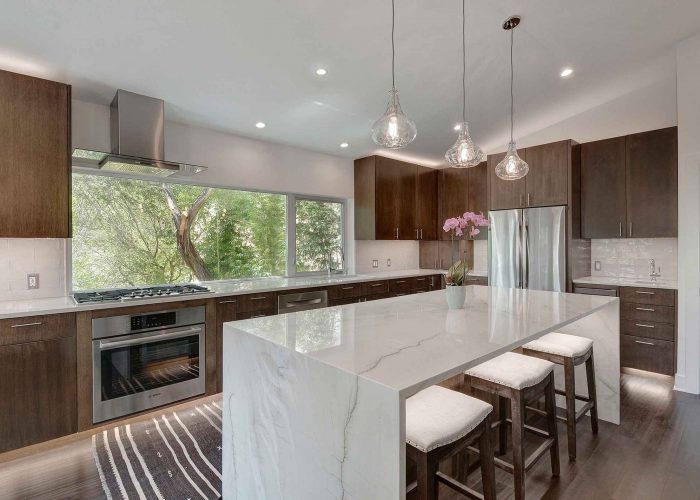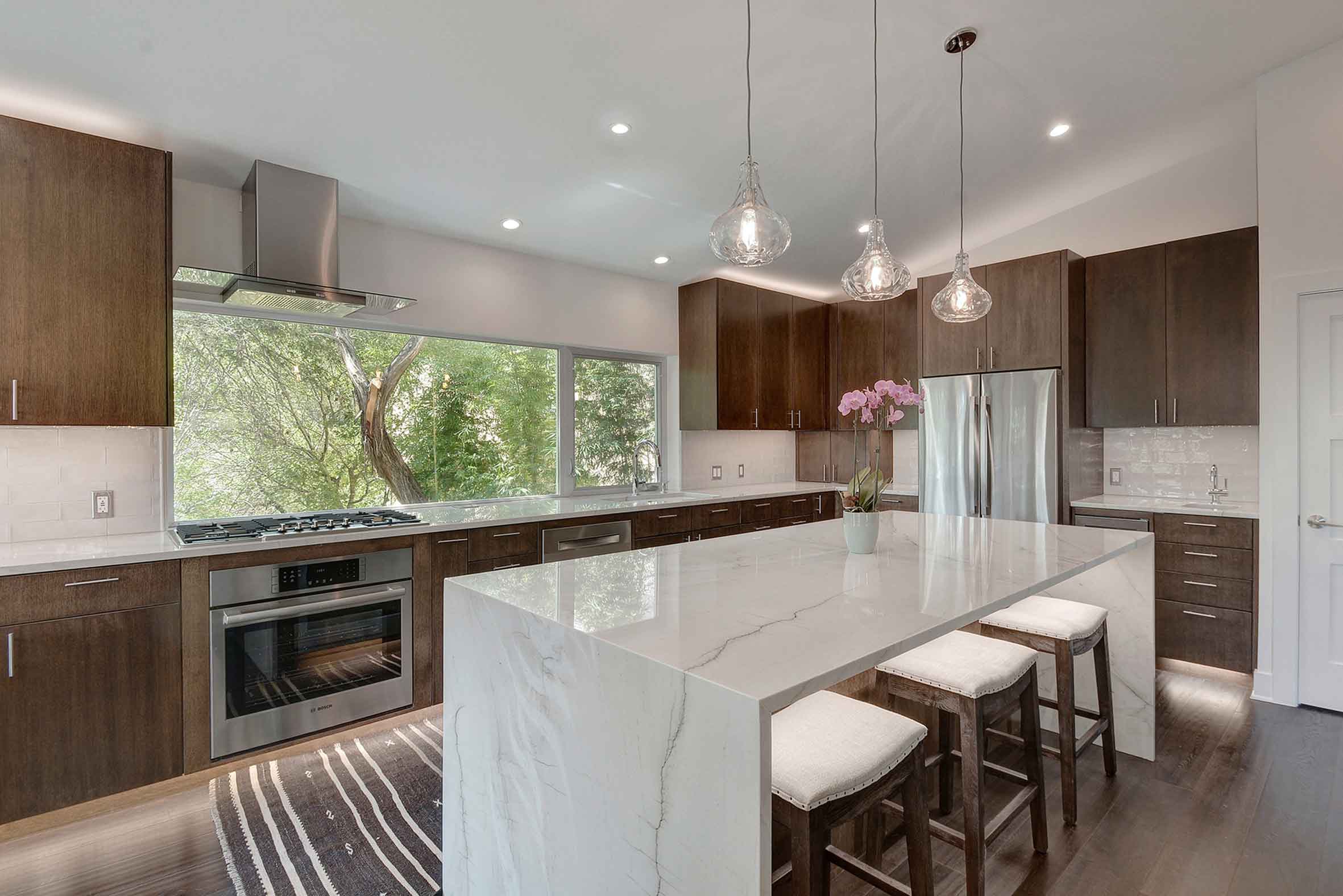Corian vs Granite Worktops
Granite Worktops
Corian vs Granite Worktops
Choosing new worktops for your kitchen can be difficult. With so many materials and options available, knowing the differences, as well as the pros and cons of each option, can help you to make the best choice for your kitchen.
Granite and Corian worktops are two common countertop material options that are popular with many homeowners. Corian (also known as solid surface worktops) is an engineered surface but granite is a natural stone. Both are completely different materials but they each have their own advantages and disadvantages.
In this guide, we’ll have a look at the differences between the two materials so you can make an informed decision for your kitchen countertops.

What is a Corian worktop?
A Corian worktops is the brand name for a specific type of solid surface worktop created by kitchen company DuPont in the 1960’s. Corian is the specific brand of solid surface worktop but the two terms are often used interchangeably so it’s important to be aware that not all Corian worktops will be the official DuPont Corian, they may just be solid surface worktops that have been made by another company.
Corian worktops are created using a mixture of quartz dust, polymers, resins and pigments that hold everything together. Corian countertops are available in a number of colours and patterns, depending on what you’re looking for. One of features that sets Corian worktops apart from others is that they can be moulded into a variety of different shapes.
Pros of Corian worktops
- Seamless – unlike granite or marble worktops, the seams between the slabs of Corian worktops are not visible. This can provide a smoother, cleaner look for your kitchen and worktops.
- Stain resistant – Corian worktops will resist staining and can be wiped with a clean, damp cloth and mild cleaning detergent.
- Easily moulded – Corian is an extremely versatile material that can be moulded into any shape or size. This means the edges can be curved to suit the design of your kitchen.
Cons of Corian worktops
- Expensive – whilst man made solid surface worktops can be cheaper than natural stone, Corian is still one of the more expensive options.
- Not completely heat resistant – Corian worktops can withstand a certain level of heat but they are still more susceptible to damage from hot pots and pans than other surfaces such as granite.
- Susceptible to scratching – Corian worktops are more susceptible to scratching and denting by heavy objects so you will need to take extra care when preparing food on the counter.
- Doesn’t match the individuality of natural stone – If you’re looking for something unique, Corian stone does not quite match the natural beauty of granite, especially when it comes to individual veining patterns and colours of each slab.
- Susceptible to water damage – If water seeps through the exterior resin of Corian worktops, it can damage the material underneath and cause irreparable damage.
What are granite worktops?
Granite is a natural stone that is quarried from the ground around the world. It is manually removed from the earth in quarries, cut into slabs and polished for use in your kitchen. A team of stone fabricators will be responsible for creating your granite countertops according to your kitchen design and specifications.
Granite worktops are available in unique natural colours and patterns so you will not be able to specify exactly what you want. You can choose the colour but the veining and patterning will vary from slab to slab. Even if you order a sample, it cannot be guaranteed that the slab you order will match so it’s recommended you visit your supplier to view the slabs they have on offer.
Pros of granite worktops
-
- Hard wearing and durable – Granite is one of the hardest and most durable materials available. It’s stronger and denser than other natural stones which makes it the ideal choice for a busy family kitchen.
- Heat resistant – Due to its durable nature, granite is heat resistant and will withstand temperatures from hot pots and pans in your kitchen easily.
- Low maintenance – Apart from sealing occasionally, granite worktops are extremely easy to maintain and will only need cleaning with a damp cloth and mild kitchen detergent.
Cons of granite worktops
- Extremely heavy – Granite slabs are extremely heavy and will need to be handled by professional installers. This means that the cost of delivery and installation can be higher than with other worktop materials.
You can learn more about the pros and cons of granite worktops by reading our guide.
Corian vs Granite worktops: key differences
Let’s have a look at the key differences between granite and Corian worktops.
Properties
Corian
Corian is a nonporous work surface that can be fabricated to achieve a seamless look in your kitchen. There are no spaces in the material to catch liquid spills or dirt which makes Corian worktops durable and easy to clean.
Granite
Granite is an extremely durable material but it is naturally porous so it will absorb spills which can cause permanent marking to your worktop. Other than that, its difficult to damage granite worktops and it’s less porous than other natural materials such as marble.
Durability
Corian
Corian is prone to scratches but these scratches can be removed using a scouring pad. Most Corian worktops can withstand heat but prolonged exposure to high temperatures can cause discolouration.
Granite
Granite is scratch resistant but acidic food and spills can stain the stone if you don’t clean them up in time. It’s also very heat resistant and will not crack if a hot pan is placed on it. Although granite is durable, it can chip and crack over time and it can be expensive to replace.
Appearance
Corian
Corian is available in over 100 colours which can mimic patterns and textures found in natural woods or stones. Corian is an engineered material that’s similar to Quartz but it uses a higher ratio of acrylic polymers and resin (33%) with the remaining 66% made up of natural materials.
Again, similar to quartz, the colour and design of Corian is more consistent than granite so you will have more freedom when it comes to personalising your kitchen.
Granite
Granite worktops are available in a number of different shades and colours but nowhere near as many as Corian or Quartz countertops.
As a natural stone, each slab will have variations making the stone unique and giving it a more natural appearance that cannot be replicated in any other type of worktop.
Maintenance
Corian
Corian and solid surface worktops need little to no maintenance at all. You will just need to protect your worktop from burns and scratches.
Granite
Granite needs to be sealed once a year to protect it’s porous surface from staining.
Take a look at our full range of granite worktops to find the right worktop for your kitchen or bathroom.
